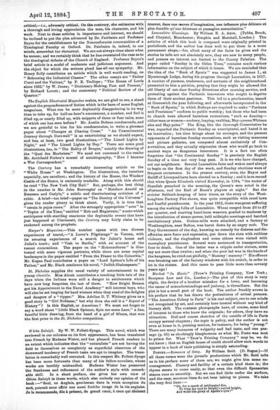Lancashire Gleanings. By William E. A. Axon. (Tubbs, Brook, and
Chrystal, Manchester; Simpkin and Marshall, London.) The articles of which this book is composed were originally printed in periodicals, and the author has done well to put them in a more permanent shape,—for, albeit many of the facts he gives and the stories he tells are not absolutely new, they are new to many people, and possess an interest not limited to the County Palatine. The paper called "Sunday in the Olden Time," contains much curious information on the subject of which it treats. We are reminded that the idea of the "Book of Sports" was suggested to James I., at Myerscough Lodge, during his progress through Lancashire, in 1617. A number of yeomen, tradesmen, and servants of the neighbourhood presented to him a petition, praying that they might be allowed the old liberty of out-door Sunday diversions after morning service, and protesting against the Puritanic innovators who sought to deprive them of their ancient pastimes. This led to a proclamation, issued at Greenwich the year following, and afterwards incorporated in the "Book of Sports," in which Bishops are required to make "Puritans and Precisians " conform to public worship; but those who had been to church were allowed harmless recreations, "such as dancing— either men or women—archery, leaping, vaulting, May-queens,Whitsun ales and May-poles." The King, like the thorough Conservative he was, regarded the Puritanic Sunday as unscriptural, and hated it as an innovation ; but time brings about its revenges, and the present opponents of harmless Sunday recreations, such as visiting museums and picture galleries, are composed almost exclusively of Con- servatives, and they actually stigmatise those who would go back to ancient ways as dangerous innovators. It is a fact too often forgotten that "the Continental Sunday" is precisely the English Sunday of a time not very long past. It is we who have changed, not our neighbonrs. Several Lancashire fairs and wakes used always to begin on the first day of the week, and Sunday elections were of frequent occurrence. In the present century, even, the Mayor and Bailiff of Liverpool have been elected on a Sunday ; and it is on record that when Queen Elizabeth visited Knowsley, in 1584, "the rector of Standish preached in the morning, the Queen's men acted in the afternoon, and the Earl of Essex's players at night." But the stricter Sabbath-keeping of later times, as the story of the West- houghton Factory Fire shows, was quite compatible with cruel laws and fearful punishments. In the year 1812, there was great suffering among the working folks of Lancashire. Wheat ranged from £6 to 27 per quarter, and starving hand-loom weavers, goaded to madness by the introduction of steam-power, held midnight meetings and hatched revolutionary plots. Cotton-mills were attacked, and a factory at Westhoughton, near Bolton, was burnt down by an angry mob. The Tory Government of the day, knowing no remedy for distress and dis- affection save force and repression, put down the riots with ruthless violence, and the ringleaders and some others were visited with exemplary punishment. Several were sentenced to transportation, four to death. One of the latter was a cripple under sixteen, some say not more than twelve ; and when the poor lad was in the hands of the hangman, he cried out pitifully, " Mammy ! mammy !" His offence WAS breaking one of the factory windows with his crutch, in order to let in the rioters. And this came to pass little more than seventy years ago !


































 Previous page
Previous page